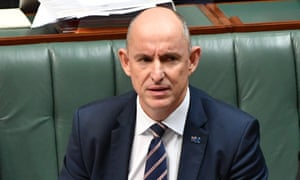Labor produce a debt notice after the minister, Stuart Robert, said claims notices had been sent out were ‘false rumours’
A Townsville woman has been hit with a $2,000 robodebt, despite the government’s repeated claims that Centrelink staff had not lifted a “quarantine” on welfare compliance in the flood-affected town.
On Tuesday the government services minister, Stuart Robert, issued a statement decrying “false rumours of debt notices” and saying “there is currently no debt recovery for income compliance in the four affected postcodes in the Townsville region”.
Questioned in the Senate last week, the social services minister, Anne Ruston, also repeatedly denied reports in Guardian Australia that Centrelink staff had been told to recommence debt compliance in the town.
On Tuesday the government services minister, Stuart Robert, issued a statement decrying “false rumours of debt notices” and saying “there is currently no debt recovery for income compliance in the four affected postcodes in the Townsville region”.
Questioned in the Senate last week, the social services minister, Anne Ruston, also repeatedly denied reports in Guardian Australia that Centrelink staff had been told to recommence debt compliance in the town.
On Wednesday, the Queensland Labor senator Nita Green sought to table the Townsville woman’s debt notice in the Senate.
Green, and Labor’s government services minister, Bill Shorten, said the debt was worth about $2,000, though the value is redacted.
Robodebt Minister Stuart Robert told the Parliament no debt recovery was occurring in flood-ravaged Townsville.
What's this?
What's this?
The debt notice was issued on 8 July and is titled: “Account Payable”. It states that the money is due on 6 August and is addressed to a Townsville postcode.
Ruston told the Senate she would look into the debt notice but expressed “extreme disappointment” the letter was not raised with her privately.
Shorten questioned Robert on his previous statements saying debt recovery was not being undertaken in Townsville.
“Why was that absolute undertaking given, when people in Townsville are currently receiving debt recovery notices as recently as this month including this $2,000 robodebt issued on the 8 July?” Shorten said.
Robert told Parliament: “As a general rule, this suspension is in place for six months unless extended.
“I have asked the department to extend the absence of debt recovery in northern Queensland for the foreseeable future until I’m satisfied that the region has recovered.”
The postcodes had been quarantined after February’s devastating floods.
Shorten said in a statement after question time: “First Mr Robert said there was no debt compliance in the Townsville area. Now he says he’s ordering it to stop.
“But the robodebt demands keep rolling in to an area still recovering from a natural disaster.”
Michael Murray, a lawyer at the Townsville Community Legal Service, previously told Guardian Australia that some residents affected by the floods were now being drawn into the controversial debt recovery program.
“You’ve got people who might have lost their homes or lost their belongings or lost their jobs as a result of the floods, they’re still dealing with all of that. They’re also dealing with the robodebt issue as well,” Murray said.
The Townsville mayor, Jenny Hill, also asked the government to suspend welfare compliance in the area.
On Monday night, Labor called for the robodebt program to be abolished, but the government says it has a legal obligation to recoup money that it says was overpaid.
The scheme is currently the subject of a legal challenge that will go to federal court later in the year.
Also on Wednesday, the Senate agreed to its second inquiry into the robodebt scheme in three years.
The Greens senator Rachel Siewert said the previous inquiry had called for the program to be suspended, but “instead, the government ramped it up.”
“To this day, people continue to be pursued,” she said. “I hear from so many people that they have given up appealing their debt even though they know they don’t owe anything simply because they cannot keep fighting such an opaque system.”
Robert was contacted for comment.



No comments:
Post a Comment